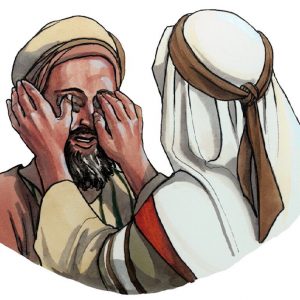 Seeing is believing:
Seeing is believing:
After Jesus healed the man born blind and the man was thrown out of the Synagogue the man met Jesus and believed. Jesus said something to him that most of us probably just pass right on by because it was just Jesus talking to this blind man who now can see. It’s not a big deal right? Anyway, here is what Jesus said to the man that I believe all of us need to pay attention to: Jesus replied, For judgment I have come into the world, so that the blind will see and those who see will become blind.” Some Pharisees who was present and asked Jesus if He was blind also, and Jesus replied, “If you were blind, you would not be guilty of sin; but now that you claim you can see, your guilt remains.”
Let me add some lines from a book titled “The Jewish Gospel of John.”
For verse 39: “Jesus revealed much more to the healed blind man. He told him the very reason he had come into the world was to judge. This meant that, in some cases he would give sight to the physically blind, and in some cases it would mean showing people that they were blind. Taking into consideration the overall thrust of John’s Gospel, which is that the Jerusalemite religious leadership are evil shepherds who are disqualified (blind) to lead, too concerned for their own status, and do not care for the good of all the sheep of the house of Israel, these words of Jesus spell out his clear purpose. He will judge the kosmos by giving sight to the blind and showing those who think they can see, that they themselves are blind. In our mind, judging someone is a purely negative action, but this is not necessarily so. Righteous judgment is, in essence, restoring/enforcing the rightful place of all that is good, righteous, and praiseworthy in God’s creation. It is affirming, strengthening, and declaring praiseworthy that which is right before God. So here Jesus is saying, not only has he come to perform signs such as giving the man born blind his sight, but he has also come to give light to those who think they see, but truly walk in darkness.”
For verse 41: “The confrontation continues. Those Pharisees who overheard this conversation challenged Jesus about his claim that they were blind. To which Jesus responded that it would have been of benefit to them to have been blind, because then they could not be accused of anything. But in their case, they must be prosecuted to the fullest extent of the law, because by their own confession, they could see. (See also 8:24) The court motif prevalent throughout the Gospels comes to its sharpest focus in this section.”
Lizorkin-Eyzenberg, Eli. The Jewish Gospel of John: Discovering Jesus, King of All Israel (Jewish Studies for Christians Book 3) (p. 148). Jewish Studies for Christians. Kindle Edition.
I believe today we need to see with the light of Christ and not our own intellectual prowess. We also need to understand that the attitude of the “Pharisees” is alive and well today.
Views: 6
